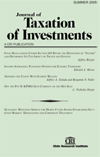Tax Chaos for Traders in Index Options
Author: Mark Fichtenbaum.
Source: Volume 36, Number 04, Summer 2019 , pp.17-21(5)

< previous article |next article > |return to table of contents
Abstract:
What happens when you put a tax person in charge of determining the fair market value (FMV) of an index option, and the experts on option trading defer to that person? Chaos. Exchange traded index options are generally treated as Section 1256 contracts, and their value is determined following Treasury regulations. Because the regulations weren’t written with index options in mind, however, the valuation can be tricky. This article explains how tax results in 2018 were skewed for some investors, and why there may be more problems in the future if some taxpayers decide to game the system. Tens of millions, if not substantially more, of phantom gains and losses are being reported to investors and the IRS via Forms 1099. Even relatively small investors are having millions of dollars of gains reported that never existed, realized or unrealized. Others are having a similar amount of phantom losses reported. Instead of being a zero sum game, this convention creates tax chaos for investors and revenue issues for the federal governments.Keywords: Section 1256 contracts, Form 1099, mark to market, incorrect Form 1099s
Affiliations:
1: MF Consulting and Twenty-first Securities.